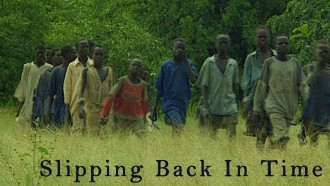
Sudan: Slipping Back In Time 2000
Distributed by Filmakers Library, 124 East 40th St., New York, NY 10016; 212-808-4980
Produced by Journeyman Pictures
Director n/a
VHS, color, 44 min.
Adult
Multicultural Studies, African Studies
Date Entered: 11/09/2018
Reviewed by Thomas J. Beck, Auraria Library and Media Center, University of Colorado at DenverSudan is a country in Northwest Africa. Muslim Arabs populate it in the north, and Black Africans, most of whom are Christian in the south. The south wants to secede from the rest of Sudan, and the result has been a long and bloody civil war. The Northerners, who control the national government, are waging a ruthless battle in the south that has left many Southerners dead, hungry or homeless. One of the most disturbing aspects of this war is that Southerners are frequently enslaved by Northerners, and as such are regularly beaten, starved and mistreated. Female slaves are often raped! This film exposes the terrible conditions in the Sudan today, and shows the attempts of a Christian aid organization to buy the freedom of those enslaved.
The film opens with long lines of slaves marching off to be sold. In this case however, they are being sold to Christian Solidarity (CSI), a charity that intends to set them free. The U.N. discourages this activity, because it feels that paying to free slaves only increases the demand for them and encourages more slave taking. CSI ignores this criticism, pointing out the many people they’ve set free and reunited with their families. Those freed, most of who are women, describe how slave raiders destroyed their homes and killed many of their loved ones, and how they were beaten, starved and raped while enslaved. The slave raids are usually not undertaken by Northerners, but by “militias” made up of Southerners employed by the North. This allows the national government to deny its involvement in these attacks, and even to deny that slavery in the Sudan exists! Northerners express their outrage at reports of atrocities and enslavement in the South, claiming they only western propaganda aimed at discrediting their Islamic government.
The war has gone on for decades, but it has become particularly vicious in the last several years. Many Southerners have fled north to escape the violence, where they are usually segregated and discriminated against. The economy in the south has been devastated by the war. Crops have been destroyed, or never planted, because of the violence. Famine has resulted, and aid agencies are frequently unable to help because of restrictions placed on them by the Sudanese government. Christian Southerners are often forcibly converted to Islam by Muslim Northerners, but even this change of religion does not ensure their safety. In the south, militias are just as likely to enslave or kill a Muslim as a Christian, because they are more driven by greed than religious considerations.
Violence and enslavement continue unabated in the Sudan. Talks are underway to end the civil war, but there is no guarantee of their success. As the talks continue, villages are destroyed, people starve and slavery grows ever stronger. In spite of all of these hardships however, the people of Southern Sudan continue to exhibit a grim determination to survive, and hopefully prosper.
The picture quality of this film is good, but not the sound. The narration is clear enough, but the voiceover translations of those interviewed are barely audible. The accents of those involved may make understanding them that much more difficult. In spite of these difficulties, this film is well paced, moving and informative. It is suitable for students on the high school, undergraduate or graduate level, and especially for those studying African or Ethnic Studies, or Political Science.
Recommended